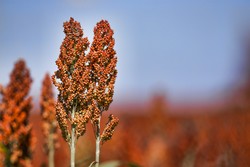Developing sorghum crop as a source for biofuels
Sorghum is a multipurpose crop producing food and feed as well as fuel from sugars in the stem. The bottleneck to date has been the lack of sorghum varieties available for production of ethanol. The EU-funded SWEETFUEL (Sweet sorghum: An alternative energy crop) project set out to pool resources to breed strains of sweet sorghum that would maximise its productivity. SWEETFUEL carried out a major breeding effort in target environments and production systems. Improved sorghum hybrids specially adapted to temperate climates, drought-prone environments and poor soils were bred and tested. Project members identified, characterised and assessed sweet sorghum traits in order to better understand relationships between traits for sugar accumulation, plant phenology and drought tolerance. Field and laboratory tests identified the main limitations and traits associated with the yield. Factors such as water consumption, nutrient uptake, harvest time and energy consumption were assessed. Based on this, the team proposed cultivation and harvest methods and developed a crop model for sorghum. Following a series of environmental, economic and technological assessments and analyses, a full sustainability assessment was delivered that identified the most sustainable sweet and biomass sorghum pathways. It also highlighted the potential environmental, economic and social benefits of cultivating sweet and biomass sorghum in contrast to the use of fossil fuels. SWEETFUEL disseminated activities and outcomes and actively promoted exchange among stakeholders. Five regional workshops were held in Brazil, Europe, India, Mexico and South Africa. It also boasts numerous publications in scientific and trade journals as well as presentations at national and international conferences and other events. Knowledge gained was used to publish a handbook providing interested parties with a current overview of key facts and figures on energy sorghum. SWEETFUEL helped optimise sweet sorghum yields in various climates by improving its genetics and agricultural practices.
Keywords
Biofuels, sweet sorghum, sugar, energy crop







